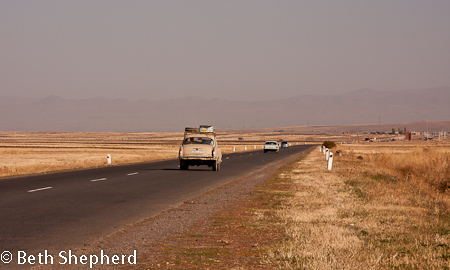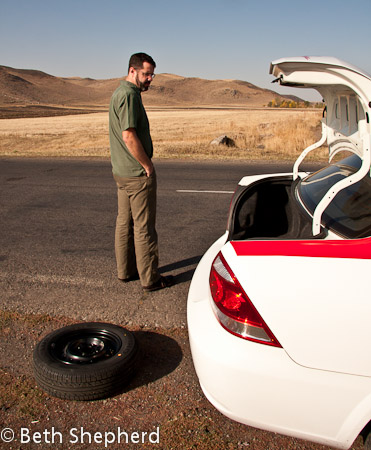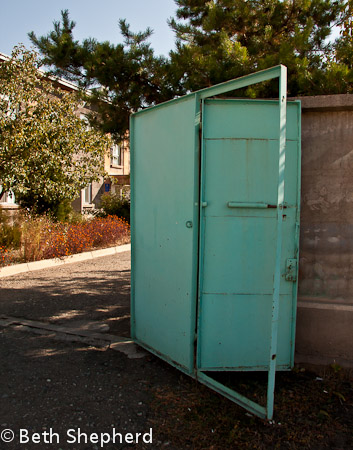 It didn’t take very long to realize there’s something about hurtling down a patched and bumpy highway in a taxi, at speeds exceeding 100 miles per hour, in the middle of rural Armenia, that lets you know you are really going somewhere. Because, in fact, we were.
It didn’t take very long to realize there’s something about hurtling down a patched and bumpy highway in a taxi, at speeds exceeding 100 miles per hour, in the middle of rural Armenia, that lets you know you are really going somewhere. Because, in fact, we were.
Side-by-side in the backseat of the cab, Big Papa and I were headed to meet the baby girl we hoped to adopt. A taxi ride doesn’t get much more potent than that.
In Armenia, taxi cabs never have seat belts, so we carefully positioned ourselves as securely as we could, and toughed it out. Our translator sat in the front passenger seat. As she chatted amiably, in Armenian, with the driver, Big Papa and I looked out the window and watched the autumn scenery pass: 13,419 foot Mount Aragats loomed to the east, snow already coating its steep slopes, brown hills as far as the eyes could see, a smattering of trees with leaves turned shades of gold and rust, acres of wheat fields, crops spent for the season, the occasional sheep or cow herder waving a stick at his flock.
Our driver appeared to be in his forties. He was slim and dark haired with an aquiline nose and a pleasant, unassuming face. I got the sense he’d been driving a taxi as long as he was old enough for his legs to reach the pedals.
We sped along toward Gyumri as Yerevan rapidly disappeared behind us. It was a two hour drive from Yerevan, the capitol of Armenia, to Gyumri in the north. As the crow flies, the distance is roughly 75 miles, but because of the twists and turns in the roads and the potholes—despite the speed we were traveling—we were told the journey would take us just under two hours.
This particular cab had seen better days, much better days in fact, which was the case for most of the taxis in Armenia. Absence of seatbelts aside, our taxi on this fine October day was also lacking shocks. Each bump in the road sent our stomach to our throats, and we literally found ourselves airborne. Repeatedly.
“Ow. Ow.” Big Papa moaned as his head made a loud thunk on the interior roof of the cab.
“I think my spine just got two inches shorter.”
I tried to stifle a laugh as I felt myself levitate a good six inches off my seat. It was like riding the mechanical bull at the county fare. My neck was already sore and we were only a half-hour out of the gate.
Two adoptive moms, who had also received referrals from the same orphanage in Gyumri, had warned me about the condition of the roads.
“Be thankful you’re not traveling in winter,” one of them wrote in an email shortly before our trip.
“To say the roads are icy and slippery is an understatement.”
For a moment I let my mind wander. Wouldn’t that take the prize? Our driver underestimates a turn a we find ourselves in a ditch. Fear fueled a burst of adrenaline in my body but I snapped into focus just in time to notice a high pitched whine coming from the rear of the car. In moments the sound of thwakety-thwak followed and the car veered to port.
Our translator anxiously questioned the driver. The driver nervously looked right and then left before pulling the car off to the side of the road. Cars flew by us as he stepped out.
“What’s going on?” I ask her.
“I don’t know. Something’s wrong with the car.”
Big Papa retorts, “You think?”
We both snicker as we turn our heads and see the driver shaking his. He opens the door and says something to our translator.
“Flat tire. We need to get out of the taxi so he can change the tire,” she tells us.
Great. Just great. I can feel a big cloud creep into my psyche as I mentally calculate the time we’re about to lose. We’ve already missed a day of visitation waiting to get permission from the Ministry of Justice Office and now, here we are, stuck roadside.
“Does he have a spare?” I ask standing inches from the ditch by the road, gazing off across the fields towards the eastern hills. The sky is gray and threatens rain.
“A spare that is road-worthy enough to get us the rest of the way to Gyumri?”
Meanwhile Big Papa has maneuvered himself toward the back of the taxi, to help hold the trunk open as the driver assesses the spare, and makes his preparations to fix the flat. I imagine Big Papa’s dilemma: he doesn’t drive, he’s in a foreign country on a highway in the middle of no-where, he’s wondering what his role in this situation is and he’s fully aware of male dominated bias of the culture particularly where it applies to men and cars.
I snap a picture.
 “Don’t.” Big Papa admonishes, but I see the hint of a smile.
“Don’t.” Big Papa admonishes, but I see the hint of a smile.
“I’m not sure I want this moment in history recorded for all perpetuity.”
I chuckle.
Soon it’s apparent that our taxi driver knows exactly what he’s doing. Not more than fifteen minutes pass standing in this wind-swept valley before he nods, smiles, and then motions us back into the taxi, thanking Big Papa profusely as Big Papa sheepishly shakes his head.
“It’s not like I did anything except stand there and be supportive with my hand on the lid of the trunk.”
We continue on our way and another hour passes uneventfully before we reach the outskirts of Gyumri. I’m relieved. I’d rather be stuck here, near the orphanage, than sticking out my thumb trying to hitch a ride in the middle of the Shirak province.
Gyumri, like the rest of the region, is still reeling—now 23 years later—following the devastating 1988 Spitak earthquake. At least 25,000 people were killed in that disaster, and the ridiculously protracted reconstruction of the Shirak region translates into its people continuing to stumble in the aftermath. Because the earthquake destroyed the economy along with the cities, the poverty rate in the northern part of Armenia is higher than the national average, nearly fifty percent, making it the poorest region in the country. I’d read that people were still living in metal cattle cars, set up as temporary housing over two decades ago.
Pulling into town, our driver is awestruck. He hasn’t been to Gyumri in years, our translator tells us, and is surprised at how much improved the city looks. It becomes quickly obvious to us that it has indeed been many years since he’s been here as we pull over to ask first one, then two, and then several people directions to the orphanage. Even the police officer at stop number three has a blank look on his face when our translator tells him the name of the orphanage. As we weave our way through town I recognize the statue of the woman who stands at attention, with her arms in arabesque, we’ve passed by her two or three times as we’ve made our aimless circles.
Finally we arrive at a corner the translator recognizes. Our driver gingerly edges our taxi over and around several crater-sized potholes, pulls over beside a stone wall with fading children’s paintings of mountains and people etched on its face like graffiti. There is an turquoise blue fence sandwiched in the middle. A scraggly tan and white dog , small with strikingly large ears, who appears to be a cross between a terrier and a corgi, saunters up to greet us. We’ve arrived.

INDEED! To all that 🙂